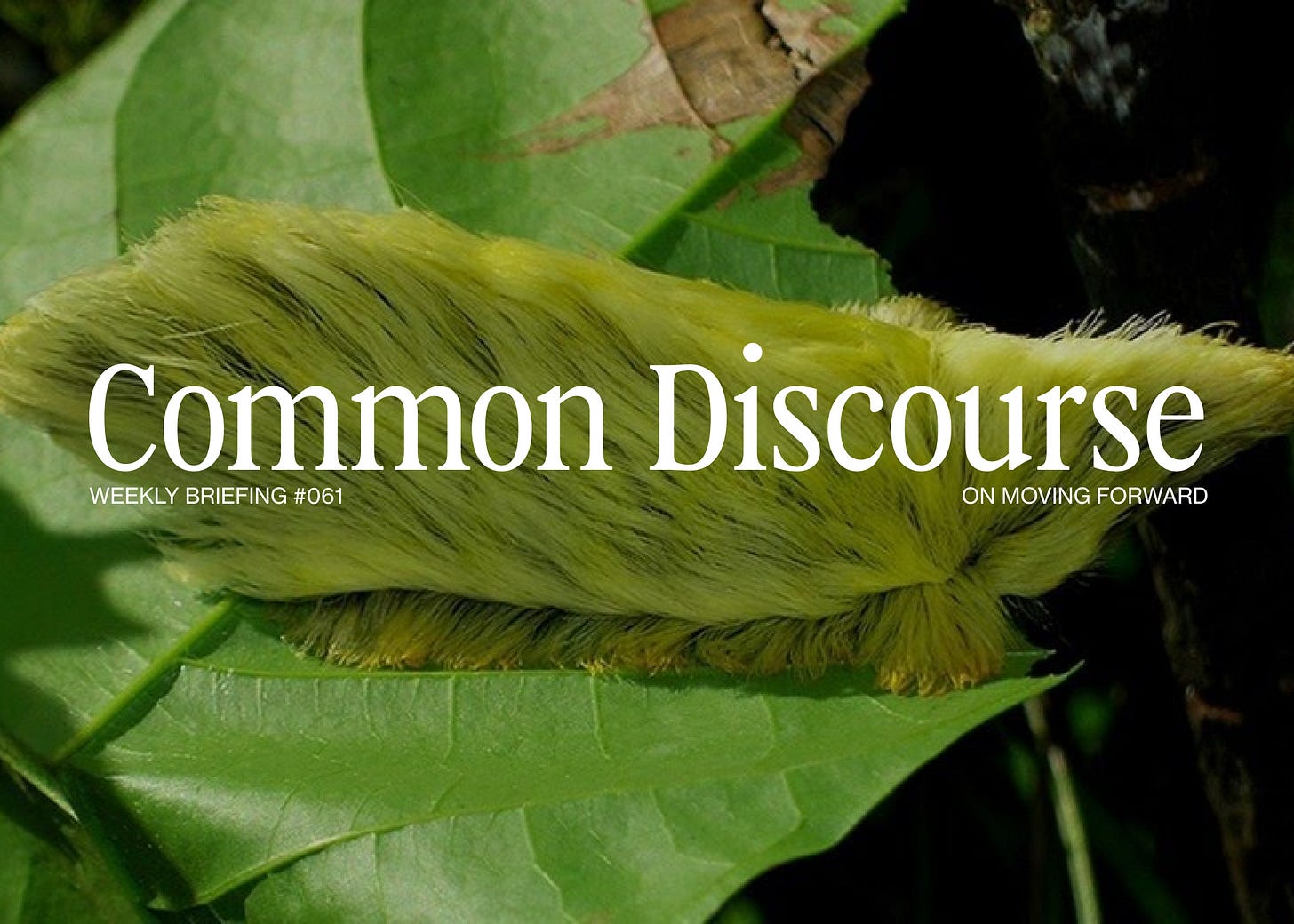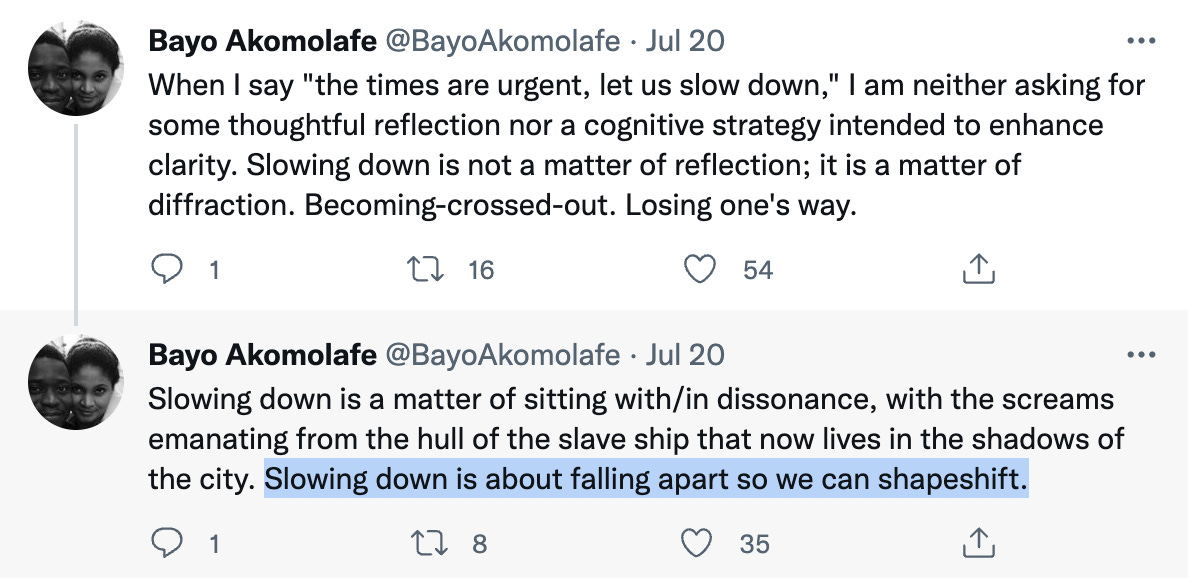#061 On Moving Forward
Common Discourse is a project designed to help others (and ourselves) think through creativity, focus, and intentional work—from Alex Tan & Alice Otieno.
Every Tuesday we share words from a journal, a few ideas, a quote from somebody else, and links worth sharing. On Fridays we invite a guest to share images from their camera roll and a sound that resonates with them.
One thing you probably find quite obvious, is the sudden slowness of this project we’ve hit over the course of Summer.
While Alex and I have become quite busy with work at the Studio and life in general, we’re cognizant of our shift of perspective on projects that once brought joy but can feel like a drag after entering the fatigue of forcing something out every week. The truth is, we love this project, and want to keep loving it. Which means we have to change our expectations for what we’re able to produce week-over-week based on the natural obstacles we find ourselves required to navigate elsewhere.
For the past several months, we’ve sent apology messages back and forth for not having a written piece done in time for our normal cadence. It feels bad, mostly. Constantly disappointing your counterparts is not something that people should opt into. So instead of continuing to feel bad, we’ve decided we’re going to bring this project to a much more manageable pace. Once per week, alternating the normal weekly briefing with Sights & Sounds.
One day we’ll get back to a normal cadence. But right now, it’s more important that we fall back in love with this project before prioritizing the frequency of output.
On Moving Forward
I sat down last Monday afternoon in preparation for Tuesday’s piece: reading articles, finding links, and quotes that resonate. I found myself having to stop as I realised that none of what I was reading actually clicked. Even though the topic at hand was one which I would’ve found interest in, I could feel my eyes gloss over the screen disengaged from the words I was reading.
Nonetheless, I tried to push through in hope that if I try to “pay more attention” and shut my mind to external distractions, it would click. But still, nothing.
For the last few weeks, I’ve been losing interest in things that used to bring me fulfillment. It can be daunting, especially in a culture and time where what we do and what we consume is often the measuring stick used in how we identify ourselves. With incessant messages that demand us to contentify every aspect of our lives and compress the complexities of who we are into a digestible “mood”, “aesthetic” or “era”, it’s no wonder that majority of us feel exhausted.
While reflecting and researching for this piece, I found the feeling often occurs when there’s a continuous amount of output required, or when you have had to be so focused on a specific task that moments away are meant for replenishment and renewal. It’s our brain’s way of switching off and seeking rest from too much external stimulation, or too much output and not enough input.
On the subject of Franz Fafka’s Writer’s Block, one contributor put it this way:
“Nobody ever told me when I was young and bouncing off the walls with exuberance and creativity that someday that wellspring might run out. That I'd wake up one day tired, so impossibly tired that when I sit down at the computer I'm asleep within 15 minutes.
…
A metaphor I like for creativity is a forest. The wood of a forest is a renewable resource, and cutting down trees can actually make the forest healthier and grow more efficiently. The problem comes when the forest is managed unsustainably; trying to meet some external short-term demand. I think that with mental health in general, many of us suffer the fallacy of thinking that because we're healthy now, we can take any amount of stress and abuse."
We get accustomed to “full tank” moments, thinking it will last forever. But much like nature, we’ll oscillate between seasons—seasons where we’re performing at an optimum, and seasons that are much slower—calling for stillness, rest and time away.
In times of pause and reflection, space is created for for us to incubate new ideas for the months or years to come.
The reflection period inevitably detaches what we create from who we are, understanding that our identity isn’t a sum total of our outputs. While what we do reveals a fraction of our identity—what we believe in and what matters to us—who we are at the core is far more intangible, flexible and sensitive.
Reclining into this truth is uncomfortable, especially in a culture that predominantly exalts hustle, 24/7 grinding, and shuns time taken away to simply just be.
Practicing slowness is less about the external activities and more about de-programming how you perceive times where you aren’t doing, or doing something that isn’t necessarily related to the task at hand. Social media may have us believe that slowing down requires us to prioritise an aestheticised version of wellness, but it’s often the opposite.
It takes as much of a shift to do nothing on the outside as it does to tell yourself internally: Taking a break or resting doesn’t take away from who I am or the goals I’m trying to achieve. It’s as much about doing nothing as it is about not letting the lack of ‘productivity’ warp your perception of self.
"The only thing for certain is that everything changes. The rate of change increases. If you want to hang on, you better speed up. That is the message of today. It could however be useful to remind everyone that our basic needs never change. The need to be seen and appreciated! It is the need to belong. The need for nearness and care, and for a little love! This is given only through slowness in human relations. In order to master changes, we have to recover slowness, reflection and togetherness. There we will find real renewal."
— Guttorm Fløistad, Slow Thought
Perhaps seasons such as this are not only a time for rest, but also necessary for realising what truly matters. I’ve learned to detach myself from definitive points of arrival and weigh up the cost of what is taken away while trying to get there. Leaning more into the everyday moments, release the idea that goals are a destination and recognise that who we become throughout the process is what’s most important.
Rest is a rebellious act in a system that profits off exhaustion. When you aren’t rested, you’re more prone to reacting than responding, you’re more likely to be led by what’s happening to you than actively making intentional choices that not only benefit you presently but also benefit your future self.
I love how Van Newman puts it in this block that presents a different angle for us to think about completion when it comes to our goals and how we move towards them:
“What would the world look like if we moved at the speed of breath? If I worked, talked, lived as fast or as slow as I needed to maintain a calm and steady breath. Imagine what that could do for our nervous systems. How that would shift us to care for the individual: an acceptance of slowing down to meet another's breath or creating environments and dynamics that keep us feeling calm, safe, at rest. The world would move much slower, but think about the collective joy that would be generated knowing everyone moved at the speed of peace. How much more happier we would all be in our work and with each other.”
— Van Newman
For me, slowing down is what has helped me move forward. Finding moments where silence and stillness are not only heard but felt. Actively telling myself to ease up when I can feel the pressures of daily life mounting on me and start taking a toll.
This means walks with no destination, snapping photos of flowers, stopping to watch light bounce in different directions, or mindfully disrupting my fixed schedule.
I’m learning to let go, and loosening my grip on things that will inevitably change either by time or season. Extending this grace to ourselves, especially when interests and productivity levels shift and develop, allows us to embrace who we are in the present moment.
— Alice
A few ideas
I. AMATUER
The word amateur has been turned into a dirty word when its intent is as pure as it will ever be. ‘Amateur’ comes from the Latin word ‘amare’ which means to love.
Just simply doing something for the love of it.
II. NICHE
One of the main reasons indie films and low budget documentaries receive such high ratings is simple: The people who like that stuff, like that stuff.
If everyone had a say, the average rating or review would drop, but that doesn’t change the substance of the film. It only changes people’s likelihood to consume thereinafter.
The issue with ‘everyone’ is that they’re more likely to negatively impact the reception of an end-product than they are to help it.
‘Everyone’ doesn’t matter nearly as much as the audience of people you’re making it for.
III. BOUNDARIES
I think we’re afraid of boundaries because we view it from the perspective of keeping others out instead of keeping ourselves in.
When we honor boundaries, we honor other people. There is no extension of ourselves if we aren’t intact to begin with.
A quote from somebody else
“Many people who want to write are unconsciously seeking peace, a coming together, an acknowledging of our happiness or an examination of what is broken, hoping to embrace and bring our suffering to wholeness.”
— Writing Down the Bones by Natalie Goldberg
Links worth sharing
🧘 queries for times of silence and reflection by Kai Jen
🛏 Dream-Journaling to Have Hard Conversations by Emma Firth via The Cut
👀 7/22/22 Are.na walkthrough that Alex featured in, talking about his channel Sonder
🧠 Make, Acquire, Judge by Zohar Atkins positions the role of an artist as an everyday life activity as opposed to a momentary act or occupation.
🥀 A Rose Blooms In Chaos, there’s something so chaotic and equally calming about this song. (thank you Misha for sharing!)
🌫 Out of all the different iterations of this meme, I think this might be my favourite one.
Thanks for consuming!
ABOUT
ℹ️ Read more about Common Discourse here.
📬 If you like this newsletter, please consider sharing with others who might enjoy it as well.
🗂 Here is every Common Discourse weekly briefing to date.
COMMUNITY
🐤 We have a Twitter feed where we populate things that resonate.
⭐ We use Are.na as a tool to archive specific aspects of this project.
🗣️ This project is more fun when there is dialogue amongst those who are reading. Use the comment feature at the bottom of this article to start a conversation, we’ll use your ideas for future briefings and food for thought.






Thank You very much for this piece!
This piece is what I needed to see before I call it a day. Thank you for this Alice